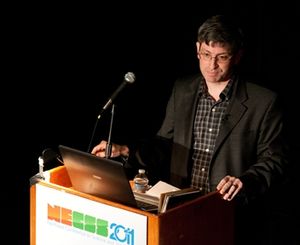Carl Zimmer facts for kids
Quick facts for kids
Carl Zimmer
|
|
|---|---|
Zimmer in 2018
|
|
| Born | July 13, 1966 New Haven, Connecticut, U.S. |
| Occupation |
|
| Language | English |
| Alma mater | Yale University (BA) |
| Subjects |
|
| Children | 2 |
Carl Zimmer, born in 1966, is an American writer and journalist. He writes about science, especially about how living things change over time (evolution), tiny creatures called parasites, and how traits are passed down in families (heredity).
He has written many books and articles for famous magazines like The New York Times and National Geographic. Carl Zimmer also teaches at Yale University. He often gives talks and has been on many radio shows, including National Public Radio's Radiolab.
Carl Zimmer says his job is to write about "what it means to be alive." He is the only science writer to have a type of tapeworm named after him! It's called Acanthobothrium zimmeri. His father, Dick Zimmer, was a politician from New Jersey.
Contents
Carl Zimmer's Early Life and Education
Carl Zimmer studied at Yale University. He earned a Bachelor of Arts degree in English in 1987.
Carl Zimmer's Career in Science Writing
Carl Zimmer started his career in 1989 at Discover magazine. He began as a copy editor and fact checker. Later, he became a senior editor there, working until 1998.
After ten years, Zimmer left Discover to focus on writing books and other projects. In 2004, he started his own blog called "The Loom." He used it to write about interesting science topics that might not become full articles. This blog was hosted by Discover and National Geographic for many years. In 2018, it moved to his personal website.
Carl Zimmer also writes a weekly column for The New York Times called "Matter." He worked with the STAT team on a 13-part series called "Game of Genomes." In this series, he explored his own genetic information with the help of many scientists.
Public Speaking and Podcasts
Carl Zimmer has given many talks at universities, medical schools, and museums. He was a main speaker at the Northeast Conference on Science and Skepticism (NECSS) in 2009, 2011, and 2018. He also spoke at the Aspen Ideas Festival in 2017 and 2018. From 2009 to 2010, he hosted a science podcast called "Meet the Scientist."
Awards and Recognition
Carl Zimmer has received many awards for his science writing. In 2007, he won the National Academies Communication Award. This award is given for excellent science communication in newspapers, magazines, and blogs.
In 2016, Yale University made him an Adjunct Professor. They recognized his amazing ability to make science easy for everyone to understand. Since 2017, he has taught a course on science communication at Yale.
Fellowships and Grants
Carl Zimmer has received several special fellowships and grants. These awards help him continue his important work in science communication.
- 2002: John Simon Guggenheim Memorial Foundation Fellowship.
- 2005: Poynter Fellowship, Yale University.
- 2006: Alfred P. Sloan Foundation Grant for Public Understanding of Science and Technology.
- 2010: Poynter Fellowship, Yale University.
- 2015: Osher Fellowship, California Academy of Sciences.
- 2017: Alfred P. Sloan Foundation Grant for Public Understanding of Science and Technology.
Honors and Achievements
Carl Zimmer has been honored with many awards for his excellent work in science journalism:
- 1994: Everett Clark/Seth Payne Award for Young Science Journalists.
- 1997: American Institute of Biological Sciences' Media Award for reporting on biology.
- 1999: The Pan American Health Organization's Award for Excellence in International Health Reporting.
- 2004, 2009, 2012: American Association for the Advancement of Science's Science Journalism Award.
- 2007: National Academies of Sciences, Engineering, and Medicine's Science Communication Award.
- 2015: National Association of Biology Teachers' (NABT) Distinguished Service Award.
- 2016: Society for the Study of Evolution's The Stephen Jay Gould Prize. This award recognizes people who help the public understand evolution.
- 2017: Online News Association's Online Journalism Award.
- 2019: Science in Society Journalism Awards for his book, She Has Her Mother's Laugh: The Powers, Perversions, and Potentials of Heredity.
- 2021: An asteroid, 212073 Carlzimmer, was named after him! Astronomers discovered it in 2005. The number 212073 is a fun secret code related to DNA.
 | Mary Eliza Mahoney |
 | Susie King Taylor |
 | Ida Gray |
 | Eliza Ann Grier |


